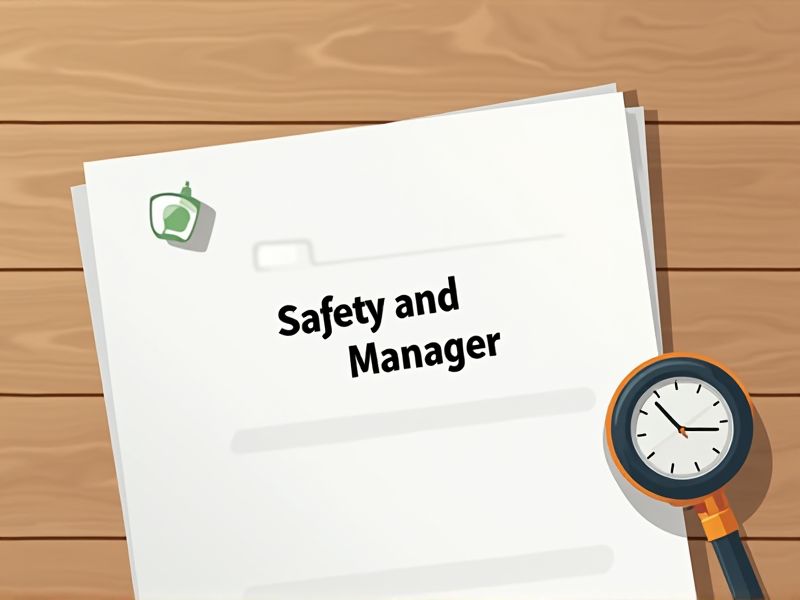
Safety and Health Managers play a critical role in ensuring workplace safety, which directly impacts employee well-being and regulatory compliance. Certifications provide them with specialized knowledge and skills necessary for effective risk management and implementation of safety protocols. When professionals hold recognized certifications, it can enhance their credibility and demonstrate a commitment to maintaining industry standards. Here are some important certifications you might need as a Safety and Health Manager.
Certified Safety Professional (CSP)
The Certified Safety Professional (CSP) credential is essential because it validates a Safety and Health Manager's expertise in identifying and mitigating workplace hazards, ultimately reducing accident rates. Earning a CSP signifies a commitment to maintaining high standards in safety management, which can influence organizational culture and prioritize employee well-being. Companies often prefer hiring certified professionals to ensure compliance with regulatory standards and minimize potential legal liabilities associated with workplace incidents. CSP certification also enhances a manager's decision-making capabilities in implementing effective safety protocols, leading to improved operational efficiency.
NEBOSH International General Certificate in Occupational Health and Safety
Having the NEBOSH International General Certificate equips Safety and Health Managers with a standardized understanding of global occupational health and safety principles. This qualification often serves as a benchmark for employers, enhancing career prospects by demonstrating a commitment to maintaining high safety standards. Comprehensive knowledge from the certificate aids in effectively identifying, managing, and mitigating workplace hazards, contributing to a safer work environment. Required by many organizations, it ensures compliance with international safety regulations, reducing the risk of legal penalties.
OSHA 30-Hour Training Certification
The OSHA 30-Hour Training Certification provides Safety and Health Managers with essential knowledge on workplace safety standards, minimizing risks and improving compliance. Proper training equips managers to identify and mitigate potential hazards, reducing the incidence of workplace accidents. With this certification, managers can effectively communicate safety protocols to their teams, fostering a culture of safety. Regulatory compliance reduces legal liabilities and financial penalties, enhancing organizational sustainability.
Certified Industrial Hygienist (CIH)
A Certified Industrial Hygienist (CIH) ensures comprehensive risk assessments, addressing potential hazards in the workplace effectively. By analyzing workplace environments, a CIH helps in identifying chemical, physical, or biological factors that might pose health risks to employees. Their expertise supports the development of control strategies, preventing occupational illnesses and injuries. With a thorough understanding of regulations, a CIH assists in maintaining compliance with safety standards, reducing the likelihood of regulatory penalties.
Construction Health and Safety Technician (CHST)
A Construction Health and Safety Technician (CHST) is essential for a Safety and Health Manager because they provide detailed expertise in job site-specific hazards, directly impacting risk reduction. Their hands-on experience with compliance ensures the implementation of safety protocols, which leads to fewer workplace accidents. CHSTs contribute to the development and execution of training programs, resulting in a more informed and cautious workforce. Their presence facilitates seamless communication between on-ground workers and management, promoting a safer working environment.
OSHA Outreach Training Program (General Industry)
The OSHA Outreach Training Program (General Industry) is crucial for Safety and Health Managers as it imparts essential knowledge on minimizing workplace hazards, ensuring safer work environments. Understanding OSHA regulations through this program helps managers effectively implement compliance strategies, reducing the risk of legal penalties. The training enhances a manager's ability to identify and address potential health risks, leading to a more proactive safety culture. By promoting safety awareness and skills acquisition, companies can reduce workplace incidents and associated costs.
Certified Hazardous Materials Manager (CHMM)
A CHMM possesses specialized knowledge in handling and managing hazardous materials, which ensures workplace compliance with environmental and safety regulations. This expertise reduces the risk of accidents and contamination, promoting a safer working environment. A Safety and Health Manager with CHMM certification can implement effective risk management strategies tailored to hazardous materials. This role enhances the organization's safety culture, leading to fewer incidents and potential liabilities.
First Aid/CPR/AED Certification
Obtaining First Aid/CPR/AED certification equips a Safety and Health Manager with essential life-saving skills required during emergencies, potentially reducing workplace fatalities. This certification ensures compliance with occupational safety regulations, mitigating legal risks for the organization. Familiarity with first aid protocols enhances the manager's ability to design effective emergency response plans, ensuring rapid and efficient incident management. Certified managers foster a culture of safety, promoting confidence and preparedness among employees, which can lead to improved overall workplace morale and productivity.
ISO 14001 Environmental Management Systems (EMS) Auditor Certification
ISO 14001 certification equips a Safety and Health Manager with the skills to identify and mitigate environmental impacts, leading to sustainable workplace practices. As organizations increasingly prioritize environmental responsibility, having certified auditors ensures compliance with international environmental standards. Demonstrating proficiency in ISO 14001 principles enhances a manager's ability to implement effective environmental policies. This certification aligns safety and environmental goals, reducing risk and enhancing organizational reputation.
Certified Risk Manager (CRM)
A Certified Risk Manager (CRM) offers expertise in identifying potential hazards, crucial for developing effective safety and health protocols. Their skills in risk assessment lead to more precise control measures, minimizing workplace accidents and incidents. CRMs use their proficiency in strategic planning to ensure compliance with regulatory standards, mitigating legal and financial repercussions. Their guidance enhances organizational resilience, fostering a safer work environment and contributing to overall employee well-being.
Summary
As a Safety and Health Manager obtaining certifications, you enhance your credibility and professional competency in the field. This often leads to improved safety practices within the organization, reducing workplace accidents and possible liabilities. Your expertise can increase team confidence and morale, potentially boosting overall productivity. Certifications may also open pathways to career advancement and higher earning potential.
